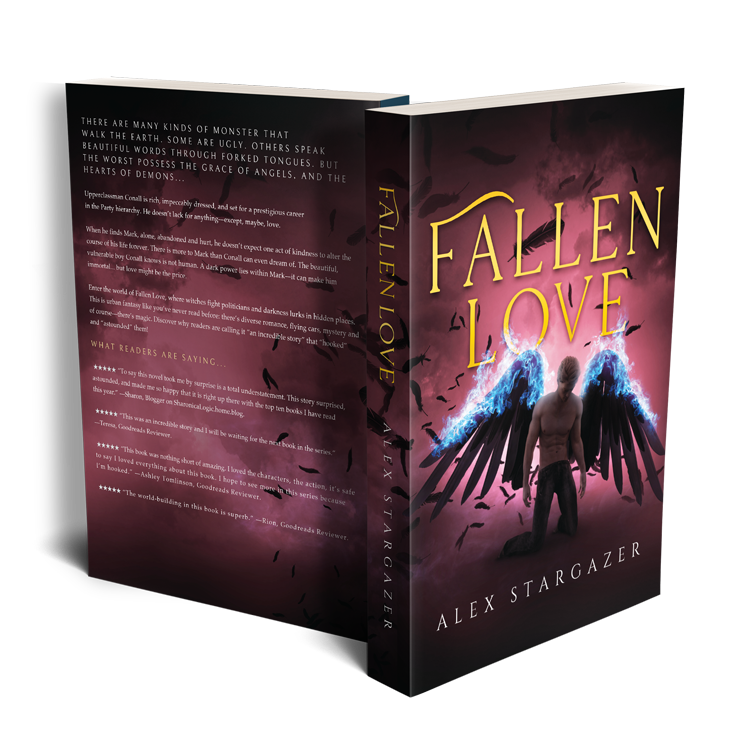
Fallen Love
Book One of the Fallen series
Alex Stargazer
Gay Urban Fantasy
Release Date: 02.05.20

Blurb
There are many kinds of monster that walk the Earth. Some are ugly. Others speak beautiful words through forked tongues. But the worst possess the grace of angels, and the hearts of demons.
Upperclassman Conall is rich, impeccably dressed, and set for a prestigious career in the Party hierarchy. He doesn’t lack for anything—except, maybe, love.
When he finds Mark, alone, abandoned and hurt, he doesn’t expect one act of kindness to alter the course of his life forever. There is more to Mark than Conall can even dream of. The beautiful, vulnerable boy Conall knows is not human. A dark power lies within Mark—it can make him immortal… but love might be the price.
Fallen Love has dark magic, sweet romance, and lots of action.
Buy link:
Hello everyone at Love Bytes! Thank you for letting me write here. Today I’m going to talk about love. How do we write about love in fiction? What differences are there between the genres? And why is the depiction of love important?
Before I get into the meat of things, please check out Fallen Love, my brand new urban fantasy book! It’s got LGBT romance, dark magic, and flying cars.
Insta-Love
Instant love, or “love at first sight” to give it its proper name, is something you will see a lot of in YA fantasy books. It is probably the most recognisable cliché. You’ll find it in Twilight, Hush Hush, and to some degree even in my own Fallen Love. But what constitutes love at first sight—and is it really a bad thing?
To begin with, I think there is some confusion about what “insta-love” actually is. Falling in love in a day is insta-love. In a month? I would argue that’s pretty typical for teenage relationships, and stretches the definition a little far. We hardly expect teenagers to have on/off relationships or spend years getting to know each other. (That’s adult fare.) Romeo and Juliet, to partake a famous example, certainly didn’t wait that long.
I also want to make an important distinction between narrative time and real time. Narrative time is basically about how something is weighted in the narrative. For example:
“A year passed, and in that time their relationship blossomed and grew till it became a rose, rich with bloody emotion.”
In two lines, the narrator tells us that a year has passed. This is a long time in real time, but only a very short while in narrative time—if I wanted, I could have used the whole book to explore what happened in that year. But I didn’t, because I had more interesting things I wanted to tell.
Is insta-love a bad thing?
I think two arguments can be made here. Some would argue that YA Fantasy is fantasy, and therefore doesn’t have to worry too much about realism. If falling in love instantly is romantic, and it works artistically (as Romeo and Juliet surely does) then it’s fine.
This argument might be a bit unsatisfying though, so let’s look at a different one. The fact is, young people feel love passionately, like divine madness. No one understood this better than the Greeks.
Plato’s Phaedrus is a dialogue between Lysias (in absentia) and Socrates. Lysias argues that it is better to cultivate friendships rather than romantic relationships, for friendships have many advantages over love:
- They don’t breed jealousy.
- Love only allows one lover, whereas a man can be friends with many people, and learn from all of them.
- Friendship makes people better by cultivating prudence and virtue, which is the exact opposite of love.
Socrates thinks this is a bad speech with bad arguments, but he makes his point by inventing another fallacious speech of his own. He adds to Lysias’ arguments that lovers often harm the objects of their desire: the man wants the boy to be friendless, separated from his family, and penniless, as that makes it easier to control him. (I’m sure we’ve all seen this in abusive relationships.) He compares the love of the erastes to the “wolf’s love of the lamb”.
Clearly, something is not right here. And Socrates hits the nail on the head: “It might be so if madness (love) were simply an evil; but there is also a madness which is a divine gift, and the source of the chiefest blessings granted to men.”
In other words, despite its many flaws, love is wonderful because it inspires men to do great things. The best kind of love, nevertheless, is one in which the lovers make each other better people.
Putting it all together
So how does this all tie together in the books we read today? In short, I think it’s all about genre. An adult romance book might explore the intricacies of a romantic relationship and its many contradictions: love can make us great—or it can destroy us. It can be passionate, friendly, sweet, or self-destructive.
But other genres portray love too; epic fantasy sometimes does, and YA Paranormal Romance does it by definition. The reader has to bear in mind that these are still fantasy books. They may touch on love, and they may weave it into the narrative. I did this in my first novel epic fantasy, the Necromancer, and I did it more in Fallen Love. Even so, the story of Fallen Love is fundamentally one of good versus evil, difficult choices and shades of grey. The romance is a part of it, an important part, but not the whole.

Two dart in front of us, and for a moment, I freeze. They are creatures of nightmare: their legs are spindly, misshapen, and they seem to glide across the road. They hiss again. A split second later, they leap.
The first is incinerated in mid-air by a laser flash, and the android crushes the second. A slick, black-green substance drips from its dead body; the smell almost makes me retch.
I snap back to reality: we need to keep running. The boy is already in front of me.
“How many?” he cries.
“Does it matter? Let the android take care of them.” Despite my cavalier words, I’m close to panic. I squint, trying to make out the Upper Quarter. Not far, I think. We can make it.
The android opens fire, and at a glance I see what the boy meant: there are many, way too many. Several fall in the firestorm, but others clamour to take their place. This isn’t a lone attack; this is a swarm. And we’re right in the middle of it.
“Run faster!” I scream. “We’re almost there!”
But it’s too late.
A mutant slams into me with the power of a sledgehammer. I heave against it, fighting with its mandibles: I have to stop those fangs, so gleaming with venom, from sinking in and finishing me off.
And then the weight is off me. Through the corner of my eyes, I see it sail high into the air and into the reach of the android, but my sight never leaves the boy who saved me.
“I had to return the bleedin’ favour,” he says, hand outstretched. I don’t have time to thank him. He lifts me and we’re running again. The lights of the Upper Quarter are tantalisingly close. They shimmer behind an immense force-field, designed to keep out mutants and undesirables. Riffraff like the boy I just rescued.
Not that I have time to worry about that right now. “My ID will open the force field!” I cry, and I throw myself forward, fumbling for the ID.
With a flash of the reader, we cross the threshold. We’re in.
We breathe deeply, and I collapse against him. The mutants hiss, disappointed, and quickly slink back from the force field. A few are not so lucky, and are noticed by one of the guard towers. Machine gun fire turns the monsters into bloody smears on the ground.
Still, my interest isn’t on the monsters—it’s on him. It isn’t just the muscles, which are hard and powerful against my body. His scent is masculine, and sends a surreptitious thrill through me.
Before, I feared death; but now, I feel very much alive.
“That was fun,” I say.
“Fuck you.”

Alex Stargazer is an author of dark, fantastical tales that snare you in with epic world-building—and keep you reading with funny anecdotes and beautiful love stories. He currently hails from rainy Scotland, but he can be found all over Europe. Since publishing his first novel—the Necromancer—at 14, Alex has released two short stories and an upcoming new novel, named Fallen Love. Sign up to his newsletter to stay up-to-date: https://mailchi.mp/c0a00cf75af3/alex-stargazer-fallen
When not establishing the finer points of magecraft or the peculiarities of dragons, Alex is working hard on getting a Master’s degree in boring topics like economics. In his spare time, Alex enjoys exploring the wilderness of Scotland—though Austria, Italy and the Nordic countries fascinate him most. If he really needs to blow off some steam, Alex will shoot zombies in his favourite shooter, Left 4 Dead 2.
Alex can be found on Twitter @AlexStargazerWE or on Facebook at Alex Stargazer Writes Books. You can also get a free short story on his website: www.alexstargazer.com






